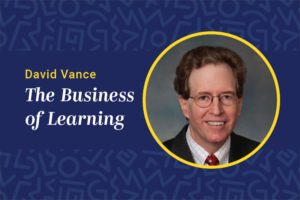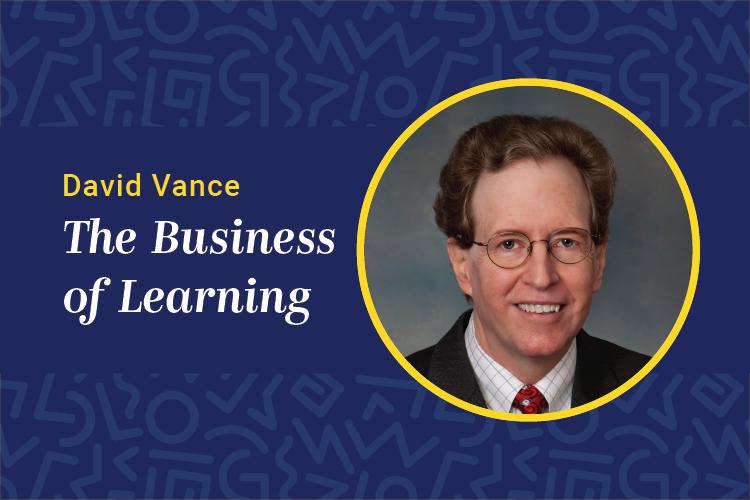 My regular readers know that I have been struggling this past year with the profession’s new focus on upskilling employees for future needs. I have been trying to understand, first and foremost, how future needs can be reliably identified now, and assuming they can, why anyone would want to provide training now when the skills and knowledge will not be needed or applied for years, which will result in scrap rates approaching 100 percent. To me, this seems to go against everything we as a profession have learned during the past 20 years in terms of good performance consulting and designing with application and impact in mind.
My regular readers know that I have been struggling this past year with the profession’s new focus on upskilling employees for future needs. I have been trying to understand, first and foremost, how future needs can be reliably identified now, and assuming they can, why anyone would want to provide training now when the skills and knowledge will not be needed or applied for years, which will result in scrap rates approaching 100 percent. To me, this seems to go against everything we as a profession have learned during the past 20 years in terms of good performance consulting and designing with application and impact in mind.
So, I was excited to see multiple sessions focused on upskilling and reskilling at the recent CLO Symposium. I looked forward to finally understanding what I clearly must be missing given the incredible popularity of this topic. I attended several sessions and they did answer at least my first question, which provided insight into my second question.
I had expected the future skills to be hard skills like programming or new manufacturing techniques, which would be difficult to predict with enough specificity to train for today. Instead, and many may already know this (it just takes me a bit longer sometimes), the future skills identified by the speakers were all soft skills. Examples included communication, teamwork, innovation, creative thinking and problem solving. This reminded me of research during the past few years that indicates these skills are indeed viewed as very important for future success. So, we have some future skills identified.
However, as I recall from the research, employers are looking for these skills in their employees today, which is why they were easy to identify. And given that these skills are needed today, we can use our tools for performance consulting to identify the gaps and we can design learning to address them. Furthermore, since the need exists today, the skills can be immediately applied, which addresses my second question. Mystery solved! We are not really talking about future skills. We are talking about skills to meet current needs, which may become even more important in the future.
Furthermore, these skills were shared in the context of their being new, as in organizations should start to train for them. Now, this is where I really felt I was going forward to the past. Guess what? When Caterpillar University was founded in 2000, we had a brand new LMS (out of favor now, I know) with hundreds of courses loaded in it. In fact, in the “old days,” training organizations used to brag about how many courses they had in their catalog (for you youngsters, this was an actual paper catalog before the LMS came around).
And what do you suppose was in that catalog? Soft skills courses! Lots of them. Courses like communication skills, team building, writing and problem solving. Sound familiar? Now, the catalog also included a lot of hard skills courses, but the point is that we have been here before.
These types of soft skill courses are not new. They always have been in demand and always will be. So, can we please apply a little historical context and be more careful about what we define as “future skills,” which, in fact, are “forever skills”?
It’s also interesting to reflect on what happened in the profession after years of training professionals bragging about how many courses they offered. Senior organization leaders began to ask for results. They wanted to know how these hundreds of courses were aligned to their goals and needs. They wanted measures beyond how many courses were offered. This led to the birth of strategic alignment, where the emphasis shifted to courses proactively and specifically aligned to meet the goals of the organization. (General, discretionary courses never went away, of course, but the focus shifted to those strategically aligned.)
For years following, strategic alignment was a hot topic at conferences and many books were written about it. And how many times did I hear strategic alignment mentioned at the CLO Symposium? Zero.
It is only natural that areas of emphasis change and evolve, but my concern is that we are not building on our past. Instead, it seems like we are reinventing it with the soft skills focus. We will advance more quickly and durably as a profession if we have a sense of our past and can skip the relearning phases. Let’s remember that soft skills are always important, as is strategic alignment. There is no need to cycle back and forth and rediscover the value of each. A wholesome future should include all that we have learned, which will provide the strongest foundation upon which to build, and then we can focus more of our energy on inventing what is truly new and special.














